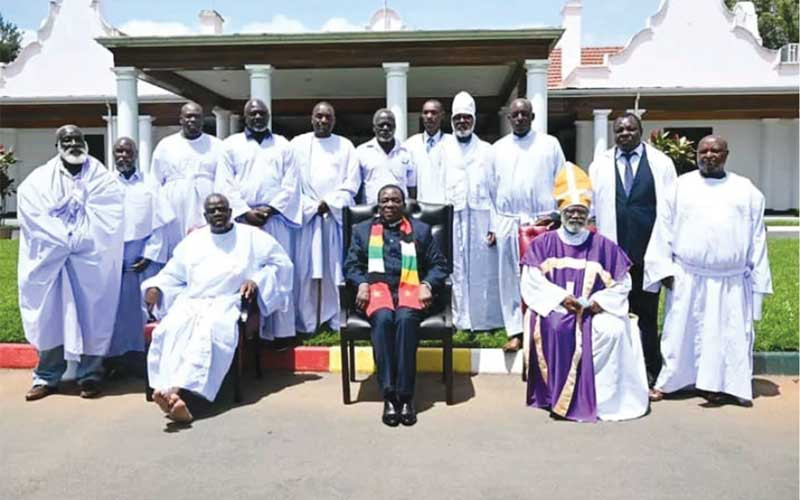
IT is election time for Zimbabwe. During the election season, politicians lose their senses, miss their planning timelines and plot against those who don’t support them.
In Zimbabwe, it is a well-known fact that Zanu PF politicians become more evil and even go to the extent of unleashing merchants of death on their rivals.
Zanu PF makes sure the poor are intoxicated with illicit spirits and free beer so that they turn against their neighbours.
Many are killed during the election season, property is destroyed and communities are left divided.
My main issue is on the indigenous churches that have abandoned the role of the church as a mediator when the earthly leadership squabble and sometimes declare war on each other.
Churches are supposed to provide counselling and shelter during conflict. They are largely considered God’s havens of safety.
That makes everything that has the cross of Jesus Christ untouchable, hence those defeated seek refuge at churches, which are deemed safe.
Elections are a constitutional requirement all over the world and there is a term limit for everyone who wins during an election.
- Makururu implores Vapostori For Ed to register to vote
- Vapostori for ED Byo launch draws fire
- CCC MPs defy Chamisa on US$40k ‘loot’
- Chikobvu loses in Chikomba DCC chairperson polls
Keep Reading
In the case of Zimbabwe, a President, councillor or Member of Parliament occupies office for five years.
When that term expires, the President dissolves Parliament and calls for fresh elections.
That means the country no longer has a ruling party and everyone goes back to the electorate to seek support.
When such a time comes, no one is in power except the President. The term of the MPs and councillors would have expired.
Some will be seeking re-election, others will be seeking assuming office for the first time, and so on.
Churches must never be at the forefront of campaigning for any political party at any given time.
They would have abdicated their role of being mediators between warring parties.
I feel Madzibaba Mapuranga has gone offside by fronting for a certain political leader using his position as a church leader.
He and his group of Vapostori for ED are not doing any good to God as they have gone against God’s teachings of loving, hosting everybody and creating a conducive environment for a peaceful Zimbabwe.
Madzibaba Mapuranga must be preaching for a non-violent election without taking sides.
The apostolic convention which his church will hold at the Zimbabwe Grounds or Gwanzura Stadium for President Emmerson Mnangagwa is an abomination.
There is nothing Godly about it as that church leader is selling out Jesus Christ.
Madzibaba Mapuranga and his team have soiled the name of God.
I understand one apostolic sect leader has been given hundreds of thousands, if not millions, of United States dollars by a certain political party to campaign for it.
God’s temples and churches are now halls for political rallies, where hate speech is spewed.
Plots to kill are being orchestrated at church shrines.
I call upon God to send his angels to punish church leaders who have deviated from the call of the Lord to foment chaos and hatred in the church.
Love for money has changed the meaning of doing the Lord’s work.- Isaac Mupinyuri
More Zim farmers must embrace spraying drones
FARMERS in Zimbabwe often face challenges such as low crop yields, pests, and diseases that affect their harvests.
However, technological advancements particularly in the fourth industrial revolution emerging technologies such as drones, robotics, artificial intelligence, data science have made it possible to overcome some of these challenges and leapfrog the infrastructure gap.
The use of advanced technologies in precision agriculture and smart farming has produced several benefits for local farmers.
Crop farming drones are unmanned aerial vehicles that can be programmed to fly over crops and spray them with various crop chemicals from pesticides to fertilisers and even foliar sprays.
Drones offer several benefits over traditional manual spraying methods like handheld knapsacks and tractor-drawn boom sprayers.
The use of drones in Zimbabwe and most countries in Africa is regulated through laws and regulations that govern their safe and legal use for commercial purposes.
A crop spraying drone is an aircraft and the operation of drones for agricultural crop spraying can only be done by trained and licensed operators.
Most crop spraying drones can weigh in excess of 50kg with a full payload and look like a small helicopter.
In Zimbabwe, the pioneer and leading commercial drone operator for agricultural applications is Precision Aerial.
It is a certified operator and also has a civil aviation authority approved training school that trains and certifies drone pilots and also offers specialised courses on drones for agriculture.
Before 2022, most farmers in Zimbabwe were sceptical of using drones for crop spraying and did not view them as a viable alternative to traditional spraying methods.
Crops that are popular for aerial crop spraying with drones for local farmers in Zimbabwe and throughout the southern Africa region include maize, sugarcane, soyabeans, sorghum, wheat, tobacco, cotton and sunflowers.
Crop spraying drones also provide an essential service to spray fruits and crops grown in orchards such as citrus, macadamia nuts, blueberries and tea.
Some of the benefits of using drones are that spraying covers a larger area in a shorter time than traditional methods.
In Zimbabwe, farmers have large plots of land, and manually spraying crops can take several days.
With crop spraying drones, farmers can cover large areas in a matter of hours.
Using drones to spray crops reduces the amount of water required for spraying by almost 90% compared to traditional methods.
The rise in the use of crop spraying drones in Zimbabwe is helping farmers to overcome some of the challenges they face and improve their profitability and sustainability.- Farmers Review Africa
Why Zim should invest in mental health interventions
BY acting now, Zimbabwe could reduce the burden of mental health conditions.
The findings of an investment case demonstrate that investing in evidence-based, cost-effective mental health interventions would, from now until 2041, provide both health and economic benefits.
By investing in mental health now, Zimbabwe could save more than 11 000 lives and gain over 500 000 healthy life years in the next 20 years by reducing the incidence, duration or severity of leading mental health conditions.
This would result in a drastically reduced burden on the community and the economy.
By investing in mental health now, Zimbabwe could gain economic benefits of US$175 million in the next 10 years and US$689 million in the next 20 years.
The productivity gains that Zimbabwe could make from investing in mental health interventions exceed the cost of the intervention packages.
Most of the interventions modelled would have a favourable benefit-cost ratio, and clinical interventions for depression and for epilepsy and a population-based intervention of a pesticide ban would have high returns on investment (ROIs).
When the social value of health is included with the productivity gains, all but one of the interventions modelled produced a positive ROI.
While the interventions modelled for bipolar disorder resulted in a lower ROI, these too are essential to support health and human rights objectives in Zimbabwe.
The results of the investment case demonstrate that Zimbabwe could reduce the socioeconomic consequences of mental health conditions by investing in a set of evidence-based intervention packages for leading mental health conditions.
The investment would significantly improve the quality of life for people with mental health conditions, lengthen life expectancy and reduce economic losses for the country.
Recommendations for actions by government to achieve these tangible benefits include:
Strengthening leadership and governance for mental health.
Increasing community awareness for mental health conditions, and encouraging multi-sector engagement to increase education and awareness of mental health.
Increasing the capacity of the health system and the healthcare workforce to provide high quality mental health interventions, and integrate mental healthcare into primary healthcare and the provision of community services.
Investing in evidence-based, cost-effective clinical and population-based mental health interventions modelled in the investment case.
Investing in health information systems and technology for collecting data on mental health and research.
Ensuring that support for mental health in emergencies is built into Zimbabwe’s mental health system and services.
All the recommendations suggested in this report are aligned with those of the World Health Organisation Special Initiative for Mental Health for Zimbabwe.- Relief Web











